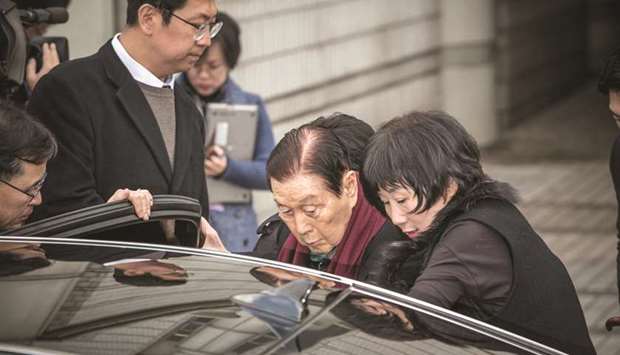Shin Kyuk-ho, a wartime migrant to Japan who returned home to build a little-known chewing-gum maker into Lotte Group, South Korea’s biggest retailer, has died. He was 97.
Shin had been hospitalised in Seoul to get medical treatment for various age-related symptoms and passed away yesterday at 4:29pm, Lotte Group said in a statement.
Shin was among the last of a generation of entrepreneurs who teamed up with the government in the 1960s to rebuild war-torn South Korea, leading to the rapid industrialisation of an economy dubbed the “Miracle on the Han River.” The growth set the stage for Lotte along with global juggernauts such as Samsung and Hyundai, while entrenching a business landscape dominated by family-run industrial groups known as the chaebol.
Shin built Lotte into the nation’s fifth-largest chaebol by assets, a group of 95 companies in businesses from department stores to petrochemicals and the Lotte Giants baseball team in the southeastern city of Busan. As his health declined, Shin was assigned a ceremonial role in the company after a push by his youngest son, Shin Dong-bin, who eventually took control of the group amid a family feud that captivated the nation.
The drama at Lotte escalated when, in 2016, Korean prosecutors began an investigation that led to indictments of Shin family members. The founder’s first daughter was arrested on embezzlement charges. Current Lotte chairman Shin Dong-bin was later imprisoned over a bribery case related to a scandal that resulted in the departure from office of former President Park Geun-hye.
Shin Kyuk-ho was born October 4, 1922, in the city of Ulsan on the southeast coast of the Korean Peninsula, which was then under Japanese occupation. The eldest of 10 children, he left Korea virtually empty-handed in 1942 in search of opportunities in Japan, according to Lotte company history.
Shin stayed on in Tokyo after World War II ended, and with the Japanese rule in Korea. In 1946, after studying chemistry and scraping savings together by delivering milk and newspapers, he started a business in Tokyo’s Shinjuku district producing soaps and pomade.
A year later he turned to making Lotte chewing gum, which gained popularity with the US soldiers stationed in Japan. By 1963, Shin had built the company into a confectionery manufacturer that employed 3,000 people. From there, he branched into advertising, baseball and trade.
In Japan, he was known as Takeo Shigemitsu, following the practice of some Koreans immigrants of taking a Japanese name. He returned to Korea in 1967, when relations between the two nations were normalised, and he opened a candy company in Seoul that would then grow to become the Lotte Group.
Shin named Lotte after the character Charlotte in Johann Wolfgang von Goethe’s The Sorrows of Young Werther. He said the book and character were loved by people spanning generations and continents, and that he wanted the same for his company, according to Lotte.
Shin typically spent half of each year in South Korea and the other half in Japan.
As the group’s fortunes grew, so did Shin’s wealth and his family’s. By 2019, the combined assets of Lotte-affiliated companies totalled more than 100tn won ($86.3bn), trailing only the Samsung, Hyundai Motor, SK and LG groups among South Korea’s chaebol, according to the Korea Fair Trade Commission.
Shin shunned many of the outward trappings of wealth and was known to inspect Lotte hotels and Lotte department stores alone, dressed in a shabby jacket, according to Lotte. When travelling overseas, he would typically go by himself.
While Shin retained the title of senior chairman, he formally passed day-to-day operations of the group to his second son, Shin Dong-bin, 64, in 2011.
In 2015, Shin and his eldest son led a failed boardroom coup attempt against Shin Dong-bin. As the founder’s health deteriorated, he became increasingly detached from the group and was left with an honorary chairman position in early 2016.
As the siblings fought, a crisis at the company deepened with the corruption investigation. In October 2019, the Supreme Court upheld a suspended jail sentence of Chairman Shin Dong-bin.
The elder brother Shin Dong-joo had been acquitted in the corruption case. In 2018, the founder was also convicted of embezzlement and breach of duty, though he was allowed to avoid jail time because of his age.
The probes took a toll on Lotte’s business, prompting the group to shelve what could have been a $4.5bn initial public offering of its hotel unit and a bid for chemicals maker Axiall Corp.
More broadly, Lotte’s turmoil turned on conflicts activists had for decades been criticising the chaebol for: The dynasties wielded too much power and ran their empires in an opaque manner that often ran afoul of minority shareholders’ interests.

Shin Kyuk-ho, founder of Lotte Group (centre), is assisted into a car as he leaves the Seoul Central District Court in Seoul in December 2017. Shin had been hospitalised in Seoul to get medical treatment for various age-related symptoms and passed away yesterday at 4:29pm, Lotte Group said in a statement.
